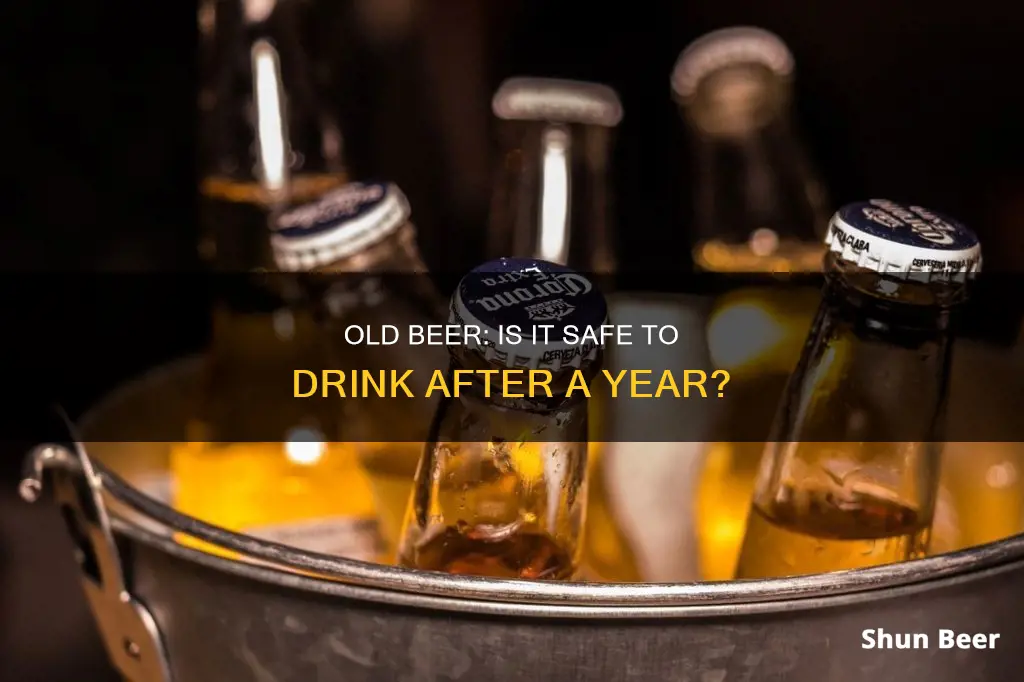
Beer is a curious beverage when it comes to expiration. While it does technically expire, it is safe to drink well past its expiration date. The worst thing that will happen is that the beer will taste bad. In fact, some beers are brewed with the intention of being aged, such as barley wines and imperial stouts. These beers can be cellared for a couple of years and develop new and interesting flavors. However, hop-heavy beers like IPAs are best enjoyed as fresh as possible, as the delicate hop aromas tend to dissipate over time.
| Characteristics | Values |
|---|---|
| Can you drink a 1-year-old beer? | Yes, but it may not taste good. |
| Will it make you sick? | No, there are no known pathogens that can live in beer. |
| How long does beer last? | Beer can be okay after two years if properly stored. Unopened beer will go bad after four to six months at room temperature. |
| Does unopened beer go bad in the fridge? | Yes, unopened beer can go bad in the fridge in two to three years. |
| Does beer go bad in the heat? | Yes, beer goes bad more quickly in the heat. |
| Does canned beer go bad? | Yes, but usually more slowly than bottled beer. |
| Does bottled beer go bad? | Yes, both dark and light bottles will go bad over time, but at different rates. |
What You'll Learn

Beer doesn't expire in the same way as food
Beer doesn't expire in the same way that food does. While food can grow harmful bacteria, the alcohol content in beer and the presence of hops—which have antimicrobial characteristics—mean that there's no risk of pathogenic growth. As Neil Witte, a Master Cicerone, explains:
> The worst thing that's going to happen to beer when it gets old is that it's going to taste bad.
While beer doesn't expire in the same way as food, it can still go bad. The four main culprits of spoiled or "skunked" beer are light, oxygen, heat, and time. Hops are sensitive to UV radiation from the sun, so beer bottles are usually tinted brown to protect against this. Even exposure to sunlight for under an hour can cause a chemical reaction that produces a compound with a distinct skunky flavour.
Oxidation also has a negative effect on beer. While there's always a small amount of oxygen in beer, oxidation sets in much more quickly in lighter styles like pilsners. The bright, malty flavours can quickly turn into acidic flavours of stewed tomatoes with a cardboard-like aftertaste.
Heat can also make beer go stale. While a bit of time at room temperature won't hurt, storing beer in a hot garage during the summer will affect its flavour. Beer is best kept in a cool, consistent, dark area, or in a refrigerator.
While beer doesn't expire like food, it can still go past its prime. The flavour and quality will degrade over time, and it's generally recommended to drink beer as fresh as possible.
Beer After Work: Why Do I Always Crave It?
You may want to see also

It's safe to drink beer that's a few years old
Beer doesn't expire in the same way that food does. There's no risk of pathogenic bacterial growth that can make you sick. As one expert explains, "Because of the alcohol content in beer, and the presence of hops—which have antimicrobial characteristics—there's not really any pathogen growth."
While it's best to drink beer as fresh as possible, particularly hop-heavy styles like IPAs, you can still drink beer that's past its prime without any health risks. In fact, some beers are brewed with the intention that they will be aged for a couple of years. These include barley wines and imperial stouts.
However, the flavour of beer will deteriorate over time. Light body, low ABV beers tend to lose their flavour faster than darker, high ABV beers. Canned beer will also do much better over time than bottled beer, as cans don't let any light in, so the oxidation process is much slower.
If you're planning on keeping beer for a long time, make sure to store it in a cool, dark place. Heat can cause beer to go bad more quickly, and light can make beer develop a foul taste.
Fitbit Beers: Compatible with Pixel 2?
You may want to see also

Beer should be stored in a cool, dark place
Beer is best stored in a cool, dark place. This is because exposure to sunlight and heat can cause the beer to spoil, giving it a skunk-like smell and taste. This is due to a chemical reaction between ultraviolet rays and acidic hop compounds.
To avoid this, beer can be stored in a basement or cellar, or in a cool, dark cupboard. Beer can also be stored in the fridge, which is ideal as it keeps the beer cool and blocks out light. The colder the fridge, the longer the beer will stay fresh.
It is also important to keep beer away from heat sources, such as ovens or radiators, and to store it in an upright position to limit air contact.
By storing beer in a cool, dark place, you can help to preserve its freshness and flavour and prevent spoilage.
Beer and Blood Work: What's the Connection?
You may want to see also

Canned beer is better for long-term storage than bottled beer
Beer is the world's third most popular drink, and it's often enjoyed at social gatherings and casual evenings. But does beer expire? And if it gets old, is it harmful to drink?
The short answer is no—beer doesn't expire in the same way that spoiled food can cause illness. There are no known pathogens that can live in beer. However, the worst thing that can happen to beer when it gets old is that its taste will deteriorate.
The shelf life of beer depends on several factors, such as packaging type, storage conditions, and beer style. Canned beer, for example, typically has a shelf life of around one to two years, while bottled beer can last up to a year.
Canned beer is superior to bottled beer in terms of long-term storage for several reasons:
- Light exposure accelerates beer spoilage and reduces drinkability. Cans are effective barriers against light exposure and oxygen, helping to prevent the beer from expiring.
- Bottled beer uses caps with a seal that can break down over time, allowing air into the bottle. In contrast, cans provide a more airtight seal.
- Beer bottles come in different colours, with amber and green bottles offering better protection from UV rays than clear bottles. However, even dark bottles let some UV light reach the beer.
- Canned beer is less susceptible to "skunkiness", which can result from light exposure.
- Overall, canned beer is a more convenient option for those looking for a fresh and flavourful brew with minimal storage concerns.
In conclusion, while both canned and bottled beer have their limitations, canned beer is the superior choice for long-term storage due to its ability to protect the beer from light exposure, oxygen, and "skunkiness".
Pouring Beer: Understanding the Inner Workings of a Faucet
You may want to see also

Beer will taste bad if it's too old
The flavour of beer deteriorates over time. Hop aromas are muted, and hop beta acids oxidise to produce an unrefined bitterness. Other forms of staling can lead to a soapy taste. The beer may also develop a cardboard/paper or lipstick aroma and flavour, caused by the formation of trans-2-nonenal, which is most common in lighter beers.
Oxidation speeds up with increases in heat and motion. This is why beer travelling long distances will inevitably have oxidative qualities. The stress of travel turns beer old fast.
Some beers are meant to be consumed fresh, while others are brewed with aging in mind. For example, barley wines and imperial stouts are often brewed with the intention that they will be aged for a couple of years.
The best way to ensure that your beer stays fresh is to store it in a cool, dark place.
The Art of Distilling: Brewing Beer, Simplified
You may want to see also
Frequently asked questions
Yes, you can drink a 1-year-old beer. Beer doesn't typically "expire" in the same way perishable food does, and there's no health risk in drinking old beer. However, the taste may deteriorate over time.
Beer lasts about 5 to 9 months beyond the expiration date listed on the label when stored at room temperature. Refrigerated beer can last up to an additional 2 to 3 years. Opened beer has a shelf life of about a day, regardless of the expiration date.
The beer's style, packaging, light exposure, and temperature will impact its flavour over time. Lighter, low-ABV beers tend to have their flavour deteriorate faster than darker, high-ABV beers. Canned beer prevents light from entering and maintains an airtight seal better than bottled beer. Beer should be stored at a temperature below 50 degrees, ideally in a refrigerator.
No, old beer will not make you sick as there are no known pathogens that can live in beer. However, the taste may be unpleasant, and old beer may cause a stomach ache.







